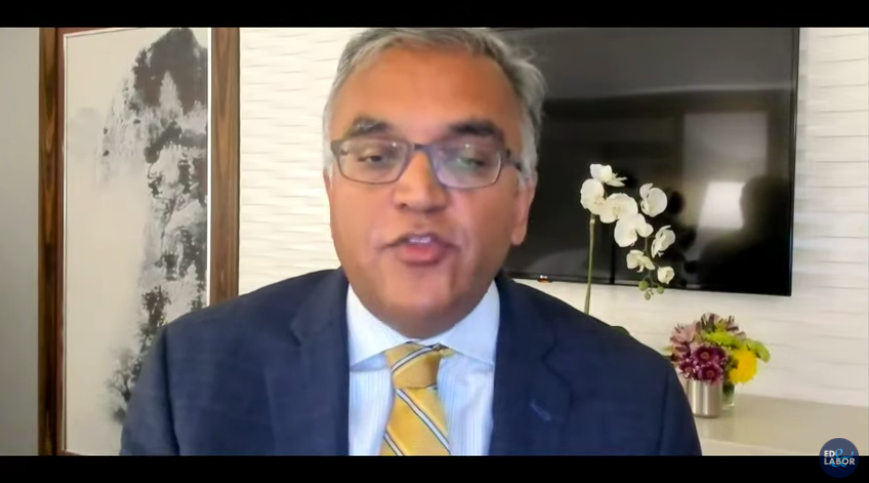WASHINGTON—Lawmakers and a variety of experts debated the best practices for reopening schools on Wednesday, agreeing on the necessity of sending students back into classrooms but disagreeing on masking.
Testifying before the House Committee on Education and Labor’s Early Childhood, Elementary, and Secondary Education Subcommittee, Journalist David Zweig—who has covered COVID-19 extensively—questioned the validity of the masking guidance from the Centers for Disease Control and Prevention, which recommends masking for everyone over age two inside K-12 schools. He referenced the World Health Organization’s guidance, which generally exempts mask requirements for children under age six, and said “millions of children” are not wearing masks in European schools.
The use of masks in European schools varies by country. In the United Kingdom, the Department of Education no longer advises the use of masks in schools. Yet, France is requiring masks for all teachers and students over the age of six, the Associated Press reported. Italy is also requiring masks for students and staff, with schools in Athens, Greece, even requiring students to show proof of a negative COVID-19 test, Euronews reported.
“There is broad consensus among experts, both in the U.S. and around the globe, that we must take a layered infection prevention approach,” said Dr. Ashish K. Jha, dean and professor of Health Services, Policy and Practice for the Brown University School of Public Health.
This includes universal masking, vaccinations, sufficient ventilation, regular testing and tracing, as well as social distancing and hand-washing, Jha said.
According to three CDC studies released this month, school districts without mask mandates were more likely to see COVID-19 outbreaks. However, Zweig maintained that masks hinder children’s learning.
“Masks are not a benign intervention,” Zweig said. “They interfere with language acquisition, reading comprehension and socioemotional development.”
Rep. Kathy E. Manning, D-N.C., questioned Zweig on his credentials, asking whether he had a medical degree or an educational background in epidemiology, infectious disease, pediatric medicine, public health or health care, to which he declined on all parts. She then directed a question to Dr. Jha, who received his master’s of public health and medical degree from Harvard University.
“Can you respond to Mr. Zweig’s position that our schools should have reopened last year, during the height of the pandemic, and his assertion that children in school should not have to wear masks?” Manning asked Jha.
Jha said that public health experts have called to reopen schools since last summer and that has become a safer reality as understanding of the COVID-19 virus has improved. In addition, he emphasized that while “none of us believe that masks are perfect,” they are an important part of a layered approach to reopening schools.
“The consensus in the entire medical community, from conservatives to liberals, if you understand how this disease works, [is that] masking is helpful,” Jha said.
Rep. Frederica S. Wilson, D-Fla., criticized Florida Gov. Ron DeSantis for his ban on mask mandates in schools.
“People in my district die everyday. We have lost dozens of teachers in Florida,” Wilson said. “DeSantis is failing to protect Florida students and educators and endangering our state’s recovery and the safe reopening of schools.“
Furthermore, Wilson pointed out Florida’s lack of COVID-19 relief funding.
“Florida is the only state which has not submitted its ESSER Plan to the Education Department to claim all of its relief funding,” Wilson said.
ESSER refers to the Elementary and Secondary School Emergency Relief Fund, which dedicates $122 billion to states and school districts through the American Rescue Plan. ESSER funding is meant to help reopen schools, keep them operating safely and address the impact of the pandemic. However, Florida is the only state in the U.S. which has yet to submit their plan on using ESSER funding to the Department of Education
In a CDC report published in December 2020, researchers found the average costs per student for implementing CDC’s recommended COVID-19 mitigation strategies ranges from $55 to $442. This includes costs for items such as masks and hand sanitizer as well as the employment of additional custodial staff and need for additional transportation.
Dr. Jha maintained that closing schools to keep children safe or sending them back to classrooms in a dangerous way is a “false dichotomy.”
“If we do vaccination, if we get kids masked up, and we do testing and ventilation, we can keep every American school open full-time this year,” Jha said.
The Senate Health, Education, Labor and Pensions Committee will meet tomorrow and hear testimony from Xavier Becerra, secretary of Health and Human Services, and Miguel Cardona, secretary of Education.

